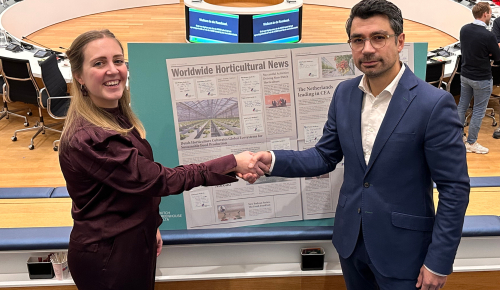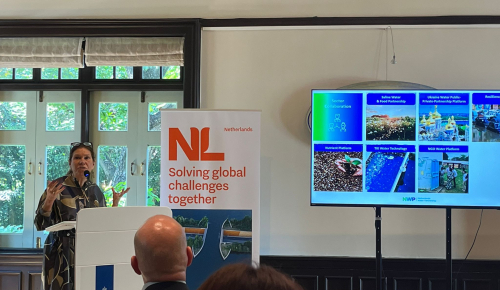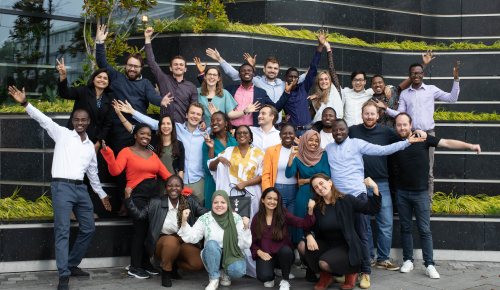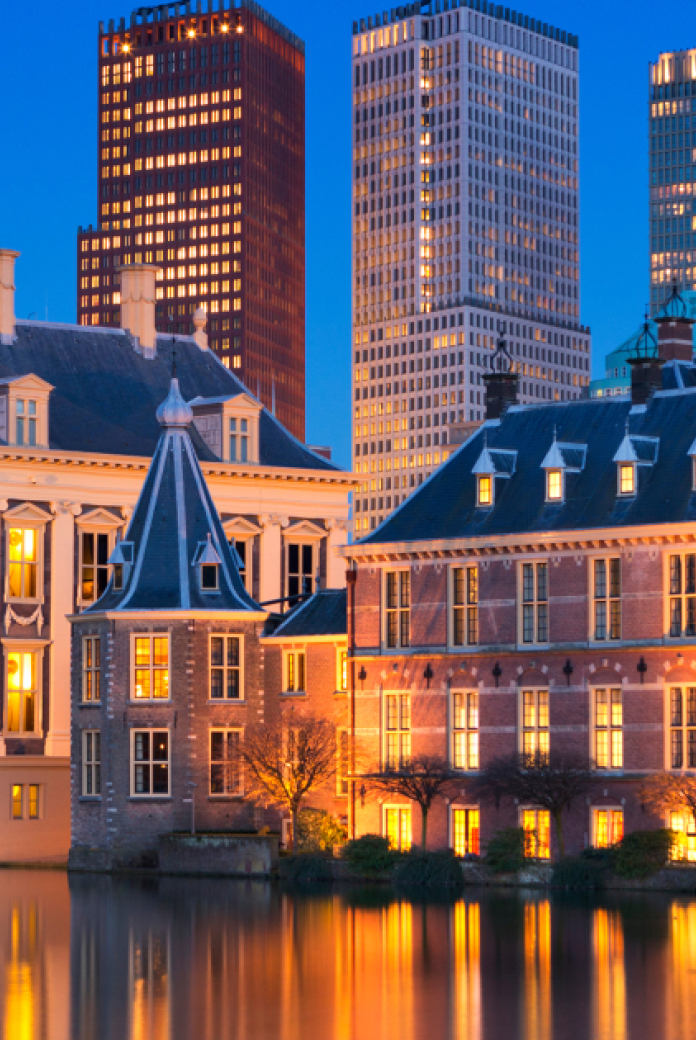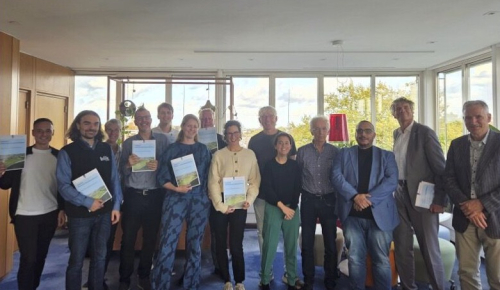Blog
23 April 2020The Hague, a stronger city after the corona crisis
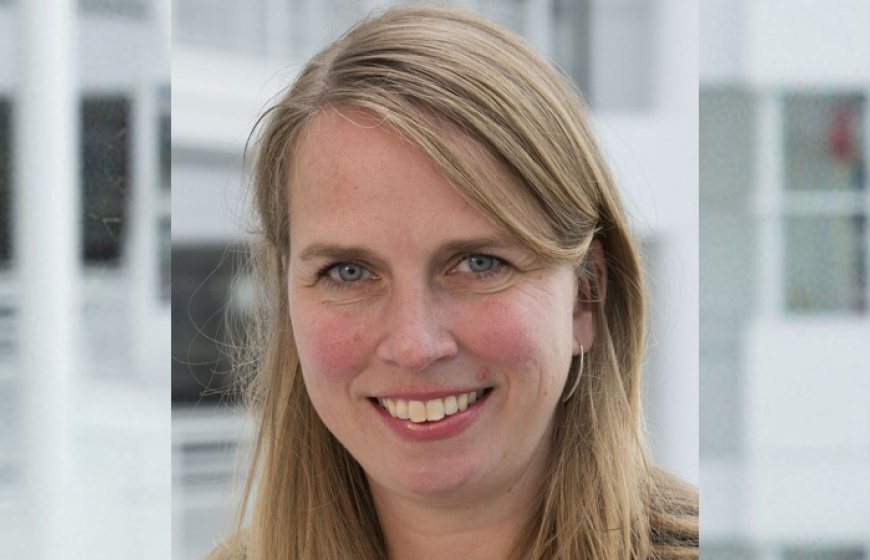
The city of The Hague is seeking to emerge from the corona crisis stronger. This requires taking emergency measures for the short term and designing solutions that will make the city more resilient and enhance its sustainable liveability in the long term. This was Anne-Marie Hitipeuw’s, Chief Resilience Officer at the Municipality of The Hague, core message at the virtual Urban Resilience Sector Meeting on 17 April. This online session was organised by the Netherlands Water Partnership (NWP) and supported by Partners For Water.
‘The corona crisis presents us with unprecedented challenges, but it also clearly shows how important it is to be resilient to the shocks and stresses we face. It is impossible to predict the magnitude and impact of a crisis or a disaster, but at the very least we need to be aware that we can be hit and that the impact may occur in a cascade. One example is that very heavy rainfall can cause flooding which subsequently could cause the electricity to fail and the telecommunications to break down. Many organisations tend to focus primarily on their own activities and provide short-term solutions. But it is essential to recognise and understand these ripple effects and use an integrated approach to deal with the effects of a crisis. Resilience is all about interdependencies and we have to break through the silos in our organisations and cities.
Impact on vulnerable groups
When studying possible crises, the Municipality tries to map the greatest impacts and their effects on vulnerable groups. Imagine if we had to stay indoors for a long time, for example due to Covid-19, and there is a heatwave and you live in a small apartment with no outdoor space and no air conditioning. We take the social aspects into account so we need to discuss crisis impacts with the neighbourhoods. One example is that we held a breakfast session on the effects of extreme weather with the Red Cross and 80 mothers from the Schilderswijk neighbourhood. Very severe crises like the corona crisis generate uncertainty, misunderstanding, and fear. So we have to listen carefully, correct inaccurate information and parry conspiracy theories. In times of crises, people rely on strong and credible governments and experts.
Corona and the climate change crises
The corona crisis is extremely tangible and we can all see its negative consequences. We have to avoid it pushing the climate crisis to the background. The climate crisis will continue after the corona crisis has passed and will bring other challenges to our cities. We need to make the impact of climate change as tangible as that of the corona crisis so that everyone understands that rapid action in climate adaptation is needed.
Take our coastal defences for example. The Hague’s coastline is sufficiently protected for the next few decades, but as climate change is happening faster than we thought, we may have to take extra measures to protect the port of Scheveningen in the coming years. Another water challenge that we face is an increasingly dry climate which could salinise our groundwater. This would have consequences for vegetation and agriculture as well as for drinking water production. We need to prepare. We will also ensure that climate adaptation is included in new construction plans so that new buildings in our city will help collect rainwater and reduce heat retention in summer.
Resilience, now more than ever
The corona crisis shows that green and open spaces close to people are essential for them to have a short break from the necessary ‘stay at home’ policy while maintaining social distance. These spaces also contribute to climate adaptation by helping cities to store water in times of emergencies such as flooding. A more holistic approach to planning that combines grey, green and blue infrastructure supports better water management and better health given that flooding is one of many sources of epidemics and diseases after natural disasters.
Sustainable liveability is key. That is also the idea behind our recent Corona Resilience Assessment. The first phase of responding to this crisis is all about resistance to and limiting the impact of the pandemic as much as possible. Next, in the recovery phase, we need to show resilience through restoring the city’s functions in the shortest possible time. And last but not least, in the growing phase, where possible, we need to ensure that the city comes out of this crisis even stronger than it went in. In other words, more sustainable and more resilient. This task is extremely complex, but we firmly believe it is an absolute necessity.
Cooperation, key factor
Along with Rotterdam, we are a proud member of the Global Resilient Cities Network. Every city in this network is dealing with the corona crisis; is looking for the best approach to manage its effects; and has many practical questions such as what measures to put in place, what works and what does not work. We share our knowledge and experience during weekly webinars and we have a very active app group. We are learning a lot from each other, which helps us take decisions. Our network also launched a campaign to help cities better protect their vulnerable communities in the face of the fast evolving Covid-19 pandemic.
From my contacts with other cities in the Global Resilient Cities Network, I can only conclude that the Dutch reputation in the field of water is still excellent. And there is no question that the Dutch water sector can do fantastic work worldwide. Last year, The Hague shared two experiences on coastal defence, the Sand Motor project at the southern end of the city and Scheveningen Boulevard, with 40 cities in the network at the Resilience Summit. I believe that the potential of the Dutch water sector can be optimally used by being open to what prospective clients have in-house and by learning from it. I believe that participation and cooperation are key in finding solutions that best suit a local context. The current corona crisis is making the benefits of cooperation clearer than ever before.’
About the online meeting and the Urban Resilience Team
During the online event, three speakers shared their visions on how organisations in the Netherlands and abroad are planning to adapt to the new challenges raised by the Covid-19 crisis while helping communities become resilient. In addition to Anne-Marie Hitipeuw, these were Piet Dircke, Global Leader, Resilience & Water Management at Arcadis, and Troy Hayes, founder and Managing Director at Troy Planning). Bianca Nijhof, NWP's Managing Director, gave an introduction to the theme and outlined NWP’s ambitions. NWP also introduced the Urban Resilience team at the event: Tim van de Staaij (Project Manager), Janett Tapia (Project Manager) and Dominika Orlowska (Urban Resilience Associate).
